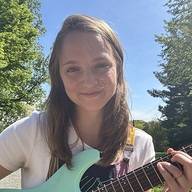There is a tapping sound on my office window, and I look up as my student enters.
“Hello, Mr. Zeke!” I say to my 13-year-old piano student.1
“Hello, Mr. Caroline!” he returns brightly (my students always call me “Miss Caroline,” so this makes me chuckle).
We walk into the session room and catch up while he acclimates to the space. As he paces the room and picks up different instruments and fidget toys, we talk about his field trip today and his upcoming soccer season.
After a minute or two of this, we talk about the goals for today’s lesson. Goal number one is to play the piano warm-up using two hands at the same time (a skill we’ve been working up to for several months), and goal number 2 is to practice his piece for the recital. He asks if we can have a break in between the goals, so I write that in too.
Okay, cool! So what made it adaptive?
Here’s what I modified within the lesson to fit this student's needs:
I hope this walk-through gives you a better idea of what an adaptive lesson might look like for you or your child. But here’s the thing about adaptive lessons: they never look the same.
Tell me more, tell me more.
Here are a few more examples (based on past experiences) of what an adapted music lesson could look like and who it might benefit:
There is so much research on the benefits of music and arts for individuals with special needs.4 My education and training as a music therapist5 means I have a working knowledge of psychology, music, and diverse learning needs. My collaborative approach means I want to hear from you and/or your child on how to support your musical aspirations. I am so excited to begin this program with everyone at The Music Studio Atlanta!
1 This a made-up lesson based on real experiences. I just like the name Zeke.
2 Mott, M. Rodwell, D. 2023. “Neurodiversity-Affirming Handbook: A handbook for parents, teachers and community allies.” AdaptED 4 Special Ed., Inc. p. 4
3 Mott, M. Rodwell, D. 2023. “Neurodiversity-Affirming Handbook: A handbook for parents, teachers and community allies.” AdaptED 4 Special Ed., Inc. p. 4
4 Mino- Roy, Jordan et al. “Effects of music, dance and drama therapies for people with an intellectual disability: A scoping review.” British Journal of Learning Disabilities, Volume 50, Issue 3. July 2021, pp.385 - 401. https://doi.org/10.1111/bld.12402
5 “What You Need to Be a Music Therapist.” American Music Therapy Association, 2023. https://www.musictherapy.org/about/requirements/
